SDTEST® has 38 different VUCA polls that calculate the 13,643 correlation values between stages of development according to the theory of Spiral Dynamics and answer options of these 38 polls.
We invite curiosity about the systemic mechanisms behind this correlation. There may be hidden variables that provide alternative explanations.
In our analysis of the poll "Where would be your next most exciting opportunity?", we found an intriguing positive linear correlation that warrants closer examination:
0.0582 (Pearson) between the In a small-medium enterprise (SME) and the Purple stage.
The critical value of the correlation coefficient for a normal distribution, by William Sealy Gosset (Student), is r = 0.051. Nevertheless, this positive linear correlation of 0.0582 meets the reliability criteria but does not necessarily imply causation.
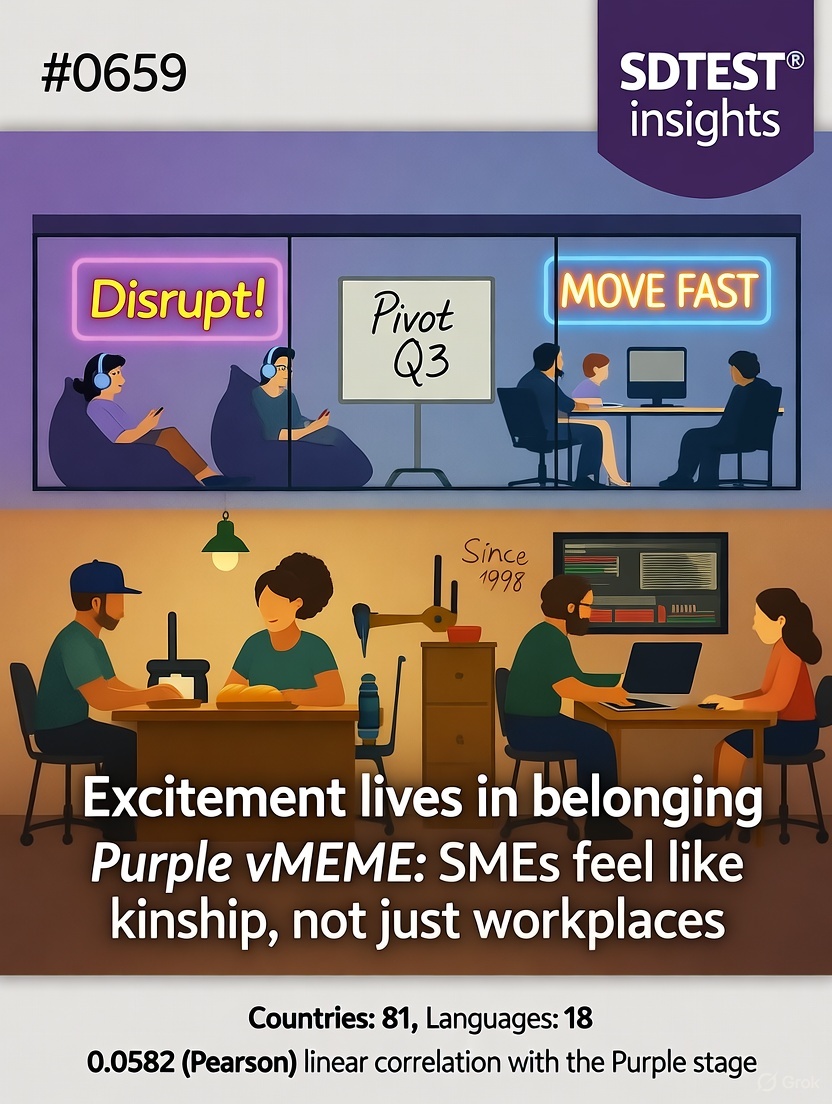
This positive correlation of 0.0582 between "In a small-medium enterprise (SME)" as an exciting next opportunity and the Purple stage offers insights when viewed through the lens of the Purple value system:
Organizational Perspective:
Organizations operating within the Purple mindset might interpret this correlation as:
- Validation of their understanding that SMEs preserve the face-to-face kinship structures and direct tribal leadership essential for maintaining spiritual cohesion and ancestral continuity
- Confirmation that their smaller scale enables the personal relationships, shared rituals, and collective identity that large organizations cannot sustain
- Evidence supporting their belief that SME environments honor traditional hierarchies and enable the personal loyalty bonds that reflect proper community organization
These organizations might respond by:
- Emphasizing their intimate size and family-like culture as spiritual advantages attracting those seeking authentic community bonds
- Creating workplace ceremonies and traditions that reinforce kinship identity and ancestral connection among SME members
- Positioning themselves as preservers of traditional values and face-to-face community that larger corporations have lost
Team Perspective:
Teams operating from a Purple mindset might approach this correlation by:
- Viewing it as an affirmation that SME team dynamics naturally preserve the intimate relationships and shared identity central to tribal belonging
- Interpreting it as support for their understanding that smaller teams maintain the cohesion and protective bonds that ensure collective spiritual safety
- Seeing it as validation for team cultures where everyone knows each other's roles, families, and spiritual standing within the community
These teams might respond by:
- Celebrating their small size as enabling deep personal knowledge and kinship bonds impossible in larger organizations
- Creating team rituals and gatherings that strengthen familial connection and shared identity
- Maintaining decision-making through consensus and elder wisdom rather than impersonal corporate procedures
Individual Perspective:
Individuals aligned with the Purple value system might interpret this correlation as:
- Personal validation that SMEs offer the intimate, kinship-based work environments they naturally seek for authentic belonging
- Evidence supporting their belief that remaining in smaller communities enables them to maintain relationships, identity, and spiritual connection
- Confirmation that SME work aligns with their ancestral values of face-to-face community and personal loyalty over impersonal career advancement
These individuals might respond by:
- Preferring SME opportunities specifically because they preserve the relational intimacy and community belonging they value
- Seeking work environments where they can know leadership personally and maintain kinship-like bonds with colleagues
- Viewing SME employment as a natural continuation of community-based identity rather than as a career compromise
This correlation, viewed through the Purple lens, suggests that those operating at the Purple level may perceive SMEs as preserving community structures and relational authenticity that larger organizations fragment.
The reasons why people with strong Purple values see SMEs as ideal next opportunities could include:
- Kinship Preservation: Understanding that SME size enables face-to-face relationships and personal knowing essential to tribal belonging
- Ancestral Alignment: Recognizing that smaller communities better reflect traditional organizational structures, honoring elder wisdom, and personal loyalty
- Spiritual Cohesion: Believing that SMEs maintain the unified identity and collective purpose that large corporations destroy through fragmentation
- Community Identity: Viewing SME work as an extension of the home community rather than a departure into impersonal corporate systems
- Ritual Continuity: Recognizing that a smaller scale enables workplace traditions, ceremonies, and shared practices, reinforcing group identity
This correlation prompts consideration of whether community-scale work genuinely better serves relational wellbeing. However, I should note important nuances:
While SMEs may offer relational intimacy, they don't automatically provide it; many SMEs operate with poor relationships, exploitative dynamics, or toxic cultures. Conversely, larger organizations can cultivate a strong community within departments or divisions.
The romantic idealization of SMEs as inherently more "authentic" or community-based risks overlooking real challenges: SMEs often offer less job security, fewer benefits, limited career development pathways, and may involve working closer to owners with less protection. People with Purple values seeking kinship and security might find those better served elsewhere.
Ultimately, this correlation highlights how community-oriented consciousness associates SME scale with relational authenticity and tribal belonging. In Purple environments, SMEs might appeal not because of size alone but because smaller organizations can more easily preserve face-to-face relationships, personal loyalty, and collective identity—though individual SMEs vary enormously in whether they actually deliver this experience.
In our analysis of the poll "Actions to Build Unshakable Self-Trust" (by Suren Samarchyan [1]), we found an intriguing positive linear correlation that warrants closer examination:
0.3304 (Pearson) between the SELF-CARE. Create a relaxing bedtime ritual and stick to it nightly / Strongly disagree and the Red stage.
The critical value of the correlation coefficient for a normal distribution, by William Sealy Gosset (Student), is r = 0.1653. Nevertheless, this positive linear correlation of 0.3304 meets the reliability criteria but does not necessarily imply causation.
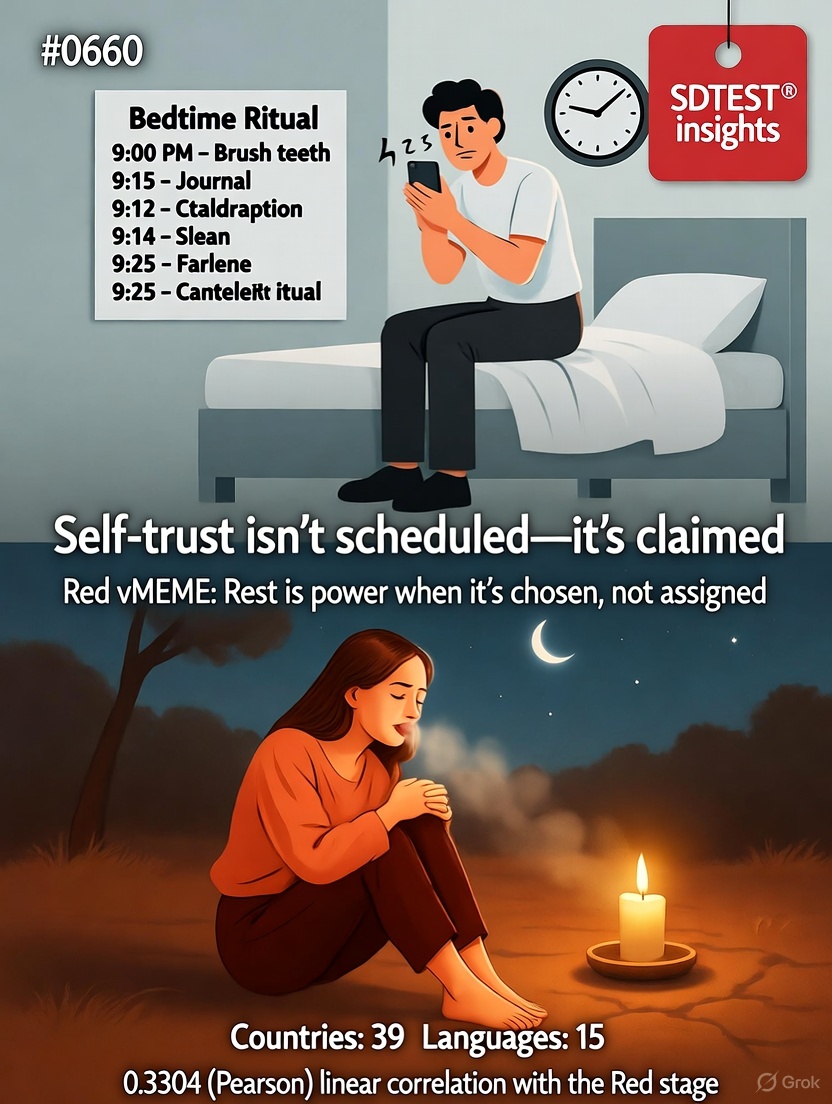
This positive correlation of 0.3304 between "Create a relaxing bedtime ritual and stick to it nightly / Strongly disagree" and the Red stage offers striking insights when viewed through the lens of the Red value system:
Organizational Perspective:
Organizations operating within the Red mindset might interpret this correlation as:
- Validation of their power-driven culture, where rigid bedtime routines signal weakness and inability to respond instantly to opportunities or threats at any hour
- Confirmation that their competitive environment demands leaders who dominate their own biological needs rather than submitting to scheduled self-care rituals
- Evidence supporting their belief that true organizational warriors prove strength through unpredictable schedules and refusal to be constrained by soft routines
These organizations might respond by:
- Celebrating leaders who work at all hours and demonstrate dominance over sleep schedules and personal routines
- Creating cultures where adherence to bedtime rituals is mocked as weakness incompatible with aggressive business conquest
- Implementing performance expectations that reward those who sacrifice predictable routines for immediate competitive advantage
Team Perspective:
Teams operating from a Red mindset might approach this correlation by:
- Viewing it as an affirmation that strong team members assert independence by refusing to follow prescribed self-care schedules
- Interpreting it as support for their belief that warriors maintain readiness for action at any moment rather than being tied to soft bedtime routines
- Seeing it as validation for team cultures where predictable self-care signals a lack of commitment to dominance and victory
These teams might respond by:
- Creating team dynamics where members compete to demonstrate they need less structure and routine than others
- Mocking teammates who maintain bedtime rituals as weak or overly controlled rather than spontaneous and powerful
- Celebrating unpredictable schedules and impulsive behavior as signs of authentic strength and self-determination
Individual Perspective:
Individuals aligned with the Red value system might interpret this correlation as:
- Personal validation of their instinct that following scheduled bedtime routines represents submission to external control rather than self-trust
- Evidence supporting their belief that true strength comes from doing what they want when they want, not from disciplined routines
- Confirmation that their impulsive approach to sleep and self-care demonstrates authentic power over their own desires and needs
These individuals might respond by:
- Actively rejecting bedtime routines as signs of weakness and inability to dominate their own biological impulses
- Viewing their unpredictable sleep patterns as demonstrations of freedom and refusal to be controlled by schedules
- Using their rejection of structured self-care as proof of their strength and independence from conventional advice
This correlation, viewed through the Red lens, suggests that those operating at the Red level may perceive structured self-care routines as antithetical to their power-focused identity and immediate gratification needs.
The reasons why people with strong Red values strongly disagree that nightly bedtime rituals build self-trust could include:
- Control Resistance: Viewing scheduled routines as submission to external authority rather than expression of personal power and autonomy
- Strength Display: Believing that dominating biological needs and refusing routine demonstrates superior willpower and toughness
- Rule Rejection: Understanding structured rituals as rules to be broken rather than practices to be followed
- Spontaneity Celebration: Valuing unpredictable, impulsive behavior as more authentic than disciplined consistency
- Weakness Stigma: Viewing the need for relaxing bedtime rituals as a sign of softness incompatible with warrior identity
This correlation prompts us to consider how power-focused value systems influence self-care practices and definitions of strength.
Ultimately, this correlation highlights a tragic paradox in Red consciousness: the pursuit of power through rejection of self-care routines likely reduces actual effectiveness and resilience. In Red environments, the strong disagreement with bedtime rituals might reflect not evolved self-trust, but rather impulsive rejection of discipline, mistaking reactive independence for genuine strength while unknowingly sabotaging the very dominance and competitive advantage that Red values prioritize.
In our analysis of the poll "I live thinking about my past, present, or future," we found an intriguing positive linear correlation that warrants closer examination:
0.5603 (Pearson) between the Future and the Blue stage (France, French).
The critical value of the correlation coefficient for a normal distribution, by William Sealy Gosset (Student), is r = 0.4826. Nevertheless, this positive linear correlation of 0.5603 meets the reliability criteria but does not necessarily imply causation.
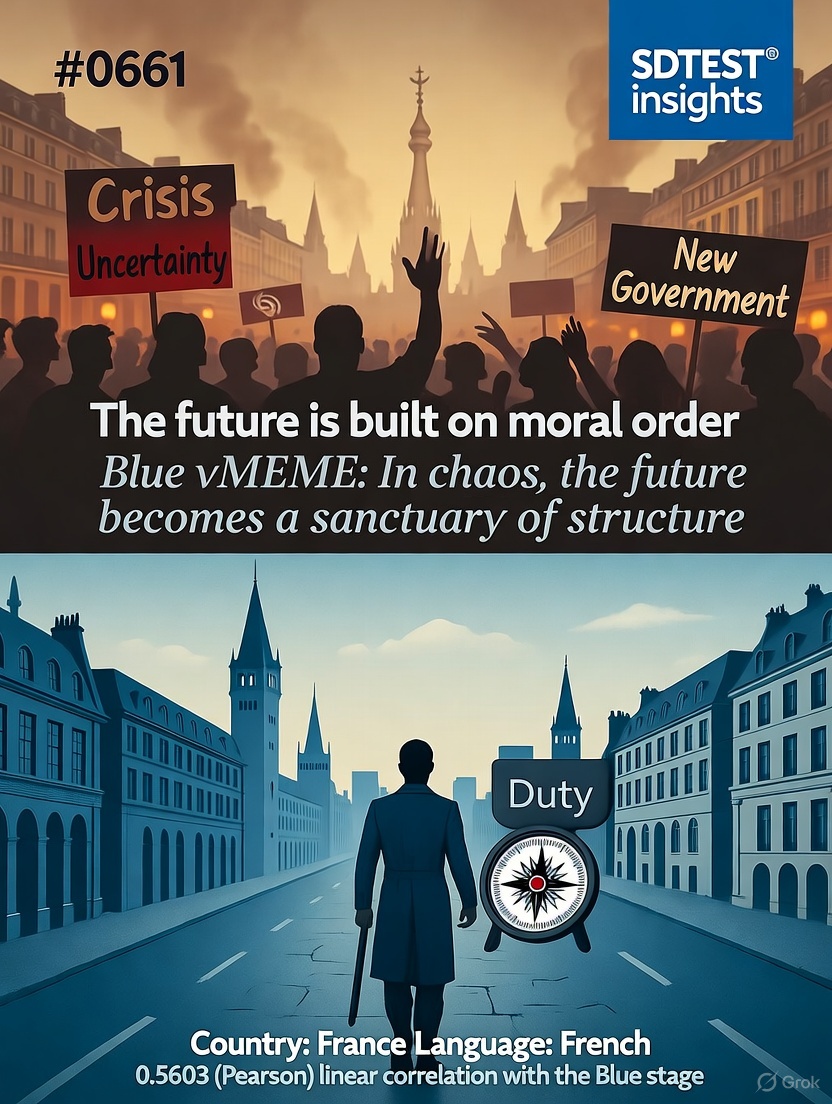
This positive correlation of 0.5603 between "Future" temporal focus and the Blue stage in France offers remarkable insights when viewed through the lens of the Blue value system:
Organizational Perspective:
Organizations operating within the Blue mindset might interpret this correlation as:
- Validation of their institutional understanding that future-orientation in France represents commitment to preserving moral order, republican values, and institutional continuity across generations
- Confirmation that their disciplined approach recognizes the future not as an abstract possibility but as a structured destiny requiring dutiful preparation according to established codes
- Evidence supporting their belief that French organizational excellence depends on future-focused planning aligned with traditional principles of institutional duty and hierarchical responsibility
These organizations might respond by:
- Implementing long-term strategic planning frameworks grounded in established French institutional values, regulatory compliance, and moral obligation to future stakeholders
- Creating succession protocols that emphasize duty to preserve organizational traditions and proper procedures for future generations
- Developing training programs that instill future-orientation as moral responsibility to uphold French institutional heritage and professional standards
Team Perspective:
Teams operating from a Blue mindset might approach this correlation by:
- Viewing it as an affirmation that proper French team functioning requires future focus rooted in collective duty to maintain professional standards and institutional integrity
- Interpreting it as support for their understanding that team planning must honor established procedures and prepare for structured future responsibilities
- Seeing it as validation for long-term team commitments based on loyalty to institutional mission rather than present-moment gratification
These teams might respond by:
- Establishing team planning processes that emphasize future obligations, professional duty, and adherence to French workplace protocols and hierarchical expectations
- Creating mentorship structures where experienced members prepare younger colleagues for future responsibilities according to traditional professional codes
- Implementing team cultures where future-orientation demonstrates proper commitment to institutional values and collective moral purpose
Individual Perspective:
Individuals aligned with the Blue value system might interpret this correlation as:
- Personal validation that their future focus reflects proper French character rooted in duty, responsibility, and commitment to moral principles
- Evidence supporting their understanding that planning for the future honors their obligations to family, institution, and the French republican tradition
- Confirmation that their disciplined approach to future preparation demonstrates righteous character and respect for established social order
These individuals might respond by:
- Structuring their lives around future duties, professional obligations, and moral responsibilities handed down through French institutional and family traditions
- Viewing future-orientation as fulfillment of their role in preserving French cultural values and proper social conduct for coming generations
- Practicing disciplined future planning as a demonstration of their loyalty to institutional authority and commitment to traditional French values
This correlation, viewed through the Blue lens, suggests that those operating at the Blue level in France anchor their identity in a morally structured future rather than a spontaneous present or a nostalgic past.
The reasons why individuals with stronger Blue values in France are significantly more likely to focus on the future could include:
- Institutional Duty: Understanding the future as a structured horizon of obligations to French republican institutions, professional codes, and hierarchical responsibilities
- Moral Consequence: Viewing future-orientation as recognition that present actions carry weight in preserving or corrupting proper French social order
- Generational Responsibility: Believing they have a duty to prepare for and preserve French institutional traditions, cultural values, and proper procedures for future generations
- Structured Destiny: Seeing the future not as an open possibility but as pra predetermined path requiring dutiful preparation according to established French protocols
- Professional Honor: Understanding that future-focus demonstrates proper French character—commitment to career advancement through merit, discipline, and loyalty to institutional standards
This correlation prompts us to consider how the French cultural context, with its strong institutional traditions, emphasis on republican values, centralized educational system, and historical reverence for proper procedures, may uniquely amplify Blue-stage future-orientation.
The French context matters significantly here: France's grandes écoles system, emphasis on professional credentials, strong labor protections requiring long-term institutional commitment, and cultural values around duty and social position create environments where Blue consciousness naturally orients toward structured futures. The correlation may reflect how French institutional architecture reinforces future-focused thinking as a moral duty rather than individual ambition.
Ultimately, this correlation highlights the profound interplay between national culture, institutional structure, and temporal consciousness. In French Blue environments, future-orientation might be understood not as entrepreneurial optimism or personal aspiration but as a moral imperative, the disciplined commitment to fulfill one's institutional duties, preserve republican values, and ensure that the French professional and social order continues with proper hierarchy, established procedures, and traditional standards intact for generations to come.
In our analysis of the poll "Gender difference in building self-confidence" (IFD Allensbach), we found an intriguing positive linear correlation that warrants closer examination:
0.1664 (Pearson) between the Own income and the Orange stage.
The critical value of the correlation coefficient for a normal distribution, by William Sealy Gosset (Student), is r = 0.0997. Nevertheless, this positive linear correlation of 0.1664 meets the reliability criteria but does not necessarily imply causation.
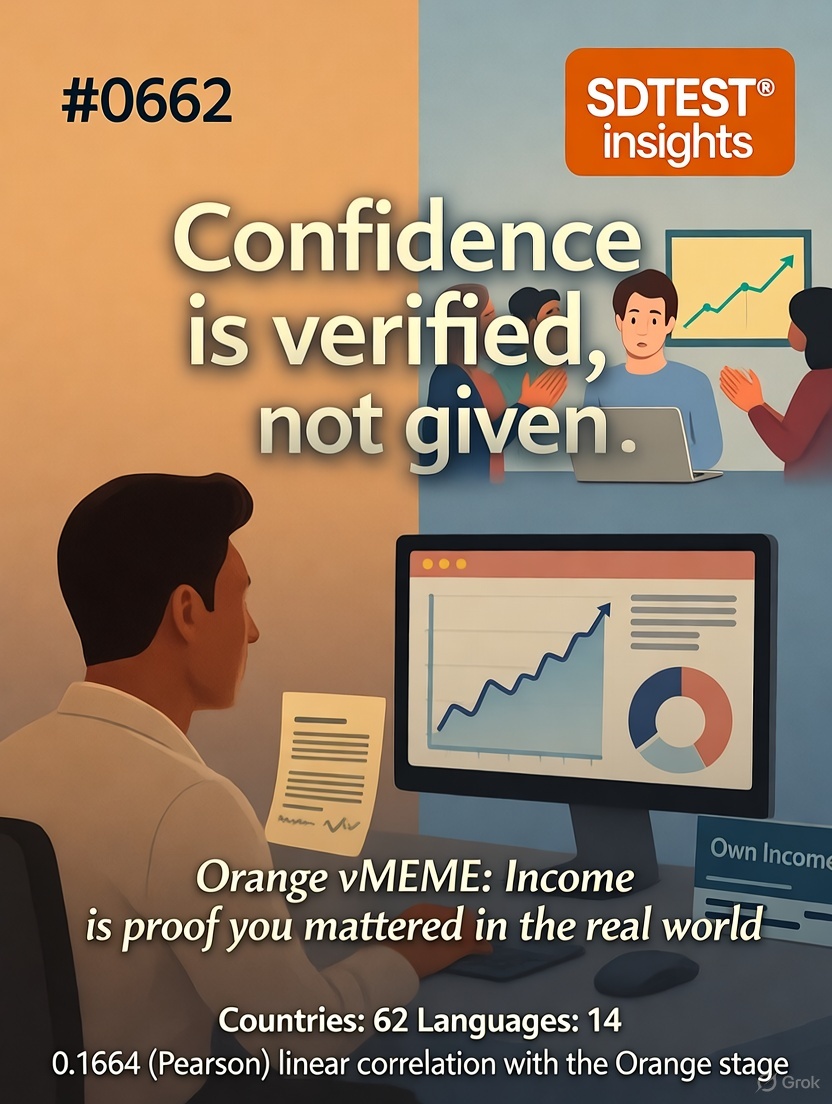
This positive correlation of 0.1664 between "Own income" as a factor in building self-confidence and the Orange stage offers revealing insights when viewed through the lens of the Orange value system:
Organizational Perspective:
Organizations operating within the Orange mindset might interpret this correlation as:
- Validation of their meritocratic framework, where income serves as an objective, quantifiable metric of individual value creation and competitive market success
- Confirmation that their performance-driven culture correctly recognizes financial compensation as a rational indicator of professional competence and organizational contribution
- Evidence supporting their belief that linking self-confidence to income optimizes motivation and drives results-oriented behavior that benefits organizational efficiency
These organizations might respond by:
- Implementing transparent compensation systems that showcase how financial rewards directly correlate with measurable performance and competitive achievement
- Creating organizational cultures where income levels are openly discussed as legitimate indicators of professional success and self-worth
- Developing incentive structures that maximize the connection between individual output, financial compensation, and personal confidence to drive productivity
Team Perspective:
Teams operating from an Orange mindset might approach this correlation by:
- Viewing it as an affirmation that high-performing teams naturally assess member value and confidence through financial contributions and earning capacity
- Interpreting it as support for their competitive culture, where income differentials reflect objective measurements of individual capability and market value
- Seeing it as validation for team dynamics, where financial success serves as the primary metric for establishing credibility and professional standing
These teams might respond by:
- Establishing team norms where discussing compensation and financial achievements is normalized as a rational assessment of professional worth
- Creating competitive environments where team members benchmark their confidence against their income relative to peers and market standards
- Implementing collaborative projects where financial outcomes serve as primary indicators of team effectiveness and individual contribution value
Individual Perspective:
Individuals aligned with the Orange value system might interpret this correlation as:
- Personal validation that their self-worth assessment based on income represents a rational, objective evaluation of their market value and professional competence
- Evidence supporting their strategic approach to building confidence through maximizing earning potential and financial independence
- Confirmation that their focus on income optimization as a confidence-building mechanism reflects a sophisticated understanding of success metrics
These individuals might respond by:
- Strategically pursuing career moves, skill development, and negotiations that maximize income as the primary pathway to legitimate self-confidence
- Using financial benchmarking and salary data to objectively evaluate their professional standing and update their self-assessment accordingly.
- Viewing income growth as a rational confidence indicator that reflects their competitive advantage and market-validated capabilities
This correlation, viewed through the Orange lens, suggests that those operating at the Orange level perceive income as the most logical and measurable foundation for authentic self-confidence.
The reasons why people with strong Orange values tie self-confidence to personal income could include:
- Objective Measurement: Understanding income as a quantifiable, market-validated indicator of one's actual value and competitive capability rather than a subjective self-assessment
- Meritocratic Validation: Believing that income directly reflects competence, skill, and results in fair market systems that reward performance objectively
- Independence Enablement: Recognizing that financial resources provide the self-reliance and autonomy essential for genuine confidence and freedom from dependency
- Competitive Benchmarking: Using income as a rational metric for assessing one's standing relative to peers and market standards
- Achievement Evidence: Viewing financial success as concrete proof of goal attainment and effectiveness rather than abstract self-affirmation
This correlation prompts us to consider how achievement-focused value systems link self-worth to financial metrics. However, I must note critical concerns about this relationship:
Ultimately, this correlation highlights both Orange consciousness's strength in objective measurement and its potential blind spot. In Orange environments, income-based confidence reflects rational analysis of market value, but may paradoxically undermine the stable self-assurance necessary for optimal performance, risk-taking, and the authentic competitive advantage that Orange values ultimately seek.
-0.5455 (Pearson) between the Sent employees on unpaid vacations and the Green stage (Germany, German).
The critical value of the correlation coefficient for a normal distribution, by William Sealy Gosset (Student), is r = 0.4043. Nevertheless, this negative linear correlation of -0.5455 meets the reliability criteria but does not necessarily imply causation.
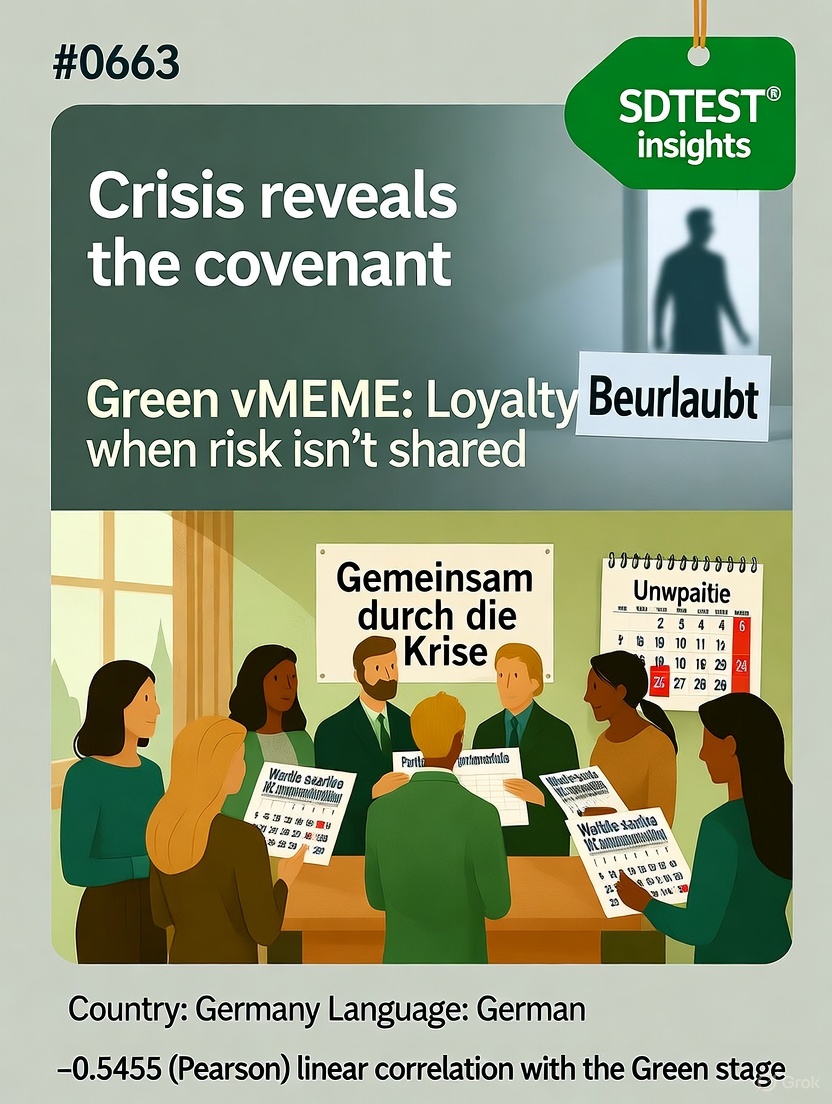
This negative correlation of -0.5455 between "Sent employees on unpaid vacations" and the Green stage in Germany offers striking insights when viewed through the lens of the Green value system:
Organizational Perspective:
Organizations operating within the Green mindset might interpret this correlation as:
- Validation of their holistic understanding that unpaid furloughs violate the fundamental principle of shared responsibility and collective well-being during organizational challenges
- Confirmation that their systems-thinking approach recognizes how forcing employees into unpaid leave fragments the organizational community and creates unsustainable inequality
- Evidence supporting their belief that genuinely inclusive organizations must find solutions that protect all stakeholders' economic security rather than shifting burdens onto the most vulnerable
These organizations might respond by:
- Implementing alternative crisis management strategies such as work-sharing schemes, collective hour reductions with salary compensation, or temporary executive pay cuts to preserve community well-being
- Creating transparent dialogue processes where employees participate in developing equitable solutions to economic challenges rather than having unpaid leave imposed upon them
- Developing organizational cultures that view employee economic security as a sacred trust requiring protection even during financial difficulties
Team Perspective:
Teams operating from a Green mindset might approach this correlation by:
- Viewing it as affirmation that authentic team solidarity requires rejecting unpaid furloughs that devastate individual members' financial security and psychological well-being
- Interpreting it as support for their understanding that teams must advocate collectively against policies that fracture community bonds through unequal burden distribution
- Seeing it as validation for their commitment to inclusive decision-making, where no team member is sacrificed without exhausting all alternatives that preserve collective dignity
These teams might respond by:
- Organizing collective advocacy to resist unpaid furlough policies and propose alternative solutions that distribute challenges more equitably
- Creating mutual aid networks and emotional support systems for any members facing economic hardship from organizational decisions
- Establishing team agreements that unpaid leave decisions will only be accepted after transparent dialogue and consensus about the necessity and fairness
Individual Perspective:
Individuals aligned with the Green value system might interpret this correlation as:
- Personal validation that their moral intuition correctly identifies unpaid furloughs as violations of community solidarity and human dignity
- Evidence supporting their belief that organizations have a responsibility to protect employee well-being rather than treating them as disposable resources
- Confirmation that their resistance to unpaid leave policies reflects evolved consciousness about interdependence and systemic justice
These individuals might respond by:
- Actively questioning and resisting unpaid furlough policies while proposing alternative solutions that honor collective responsibility
- Seeking organizational environments that demonstrate genuine commitment to employee well-being during challenging times
- Using their voice to advocate for systemic changes that prevent the use of unpaid leave as a default cost-cutting measure
This correlation, viewed through the Green lens, suggests that those operating at the Green level in Germany see unpaid furloughs as fundamentally incompatible with community-centered values and systemic fairness.
The reasons why individuals and organizations with stronger Green values in Germany are significantly less likely to report or accept unpaid furloughs could include:
- Systems Awareness: Recognizing how unpaid furloughs create cascading harm: financial stress, relationship damage, community fragmentation, that outweighs short-term organizational savings
- Collective Responsibility: Believing that organizations have a moral duty to exhaust alternatives (executive pay cuts, work-sharing, temporary wage reductions with benefits protection) before imposing unpaid leave
- Inclusion Values: Viewing unpaid furloughs as excluding employees from economic participation and violating principles of equitable treatment
- German Context: Operating within Germany's strong labor protections, Mitbestimmung (co-determination) traditions, and social market economy values that resist treating employees as variable costs
- Sustainable Perspective: Understanding that damaging employee trust and economic security through unpaid leave undermines long-term organizational resilience and community health
This correlation prompts us to consider how the German cultural and institutional context, with its robust labor councils, strong unions, and constitutional emphasis on human dignity (Menschenwürde), creates environments where Green consciousness finds structural support for resisting unpaid furloughs.
The German context matters profoundly here: Germany's Kurzarbeit (short-time work) system provides government-supported alternatives to unpaid leave, enabling organizations to reduce hours while maintaining income support. Green-conscious organizations in Germany can more easily resist unpaid furloughs because institutional alternatives exist. The correlation may reflect both Green values and institutional capacity working synergistically.
However, it should be noted the complexity: While the correlation is robust, it doesn't prove that Green organizations never use unpaid leave. Economic crises severe enough may force even values-aligned organizations into difficult choices. The correlation more likely indicates that Green-conscious entities exhaust alternatives first, communicate transparently, seek consensus, and view unpaid furloughs as a last resort rather than a routine tool.
Ultimately, this correlation highlights the profound interplay between values consciousness, institutional protections, and treatment of employees during economic stress. In German Green environments, the strong resistance to unpaid furloughs reflects a holistic understanding that genuine organizational sustainability requires protecting the economic security and dignity of all community members, recognizing that solutions fragmenting the collective through unilateral burden-shifting ultimately damage the interconnected ecosystem that organizations depend upon for long-term resilience and authentic success.
In our analysis of the poll "Are you ready to receive less pay to work remotely?", we found an intriguing positive linear correlation that warrants closer examination:
0.0723 (Pearson) between the Yes, I am ready to receive less pay to work remotely and the Yellow stage.
The critical value of the correlation coefficient for a normal distribution, by William Sealy Gosset (Student), is r = 0.0584. Nevertheless, this positive linear correlation of 0.0723 meets the reliability criteria but does not necessarily imply causation.
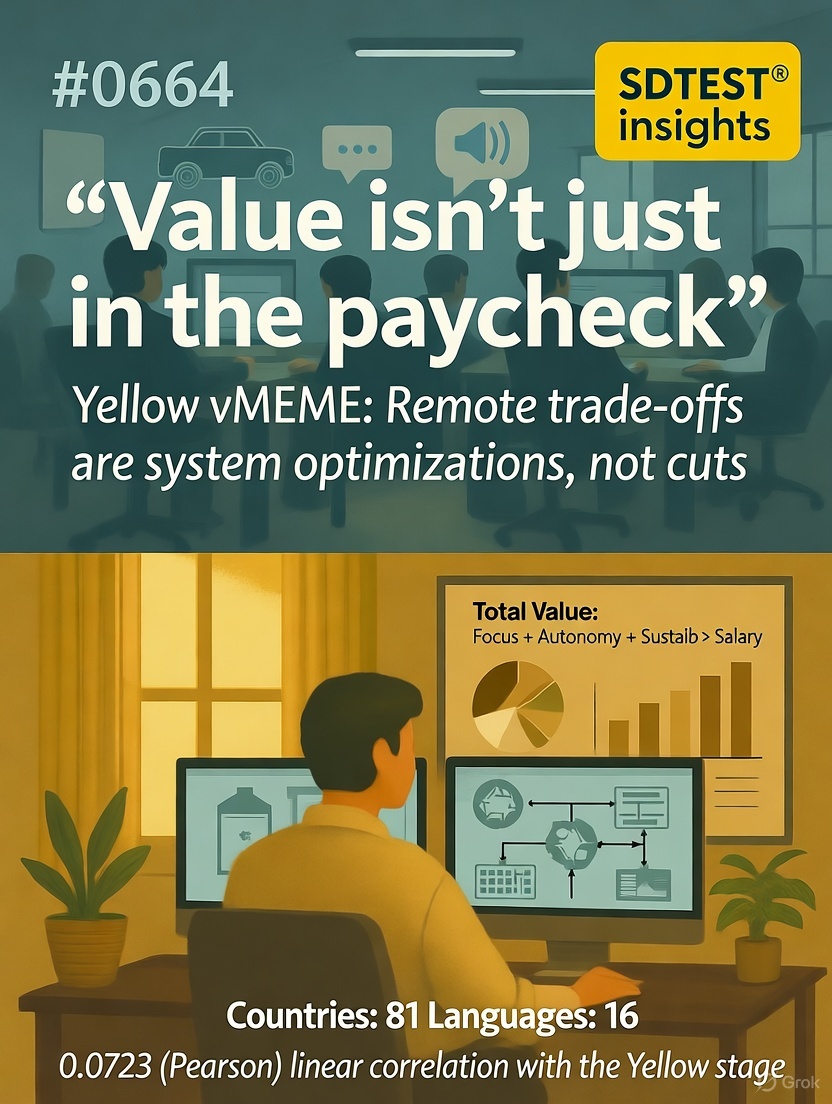
This positive correlation of 0.0723 between "Yes, I am ready to receive less pay to work remotely" and the Yellow stage offers fascinating insights when viewed through the lens of the Yellow value system:
Organizational Perspective:
Organizations operating within the Yellow mindset might interpret this correlation as:
- Validation of their integrative understanding that compensation optimization involves complex multi-variable analysis rather than simple income maximization
- Confirmation that their sophisticated frameworks recognize how remote work enables systemic life optimization, reduced commute costs, increased time sovereignty, enhanced work-life integration, which may outweigh nominal salary reductions
- Evidence supporting their belief that developmentally mature professionals evaluate total value packages through contextual, systems-aware analysis rather than single-dimensional financial metrics
These organizations might respond by:
- Implementing nuanced compensation models that transparently analyze total value exchange: salary, autonomy, flexibility, growth opportunities, across multiple life domains
- Creating organizational frameworks that honor how different work arrangements serve different developmental needs and life architectures
- Developing sophisticated dialogue processes where compensation discussions integrate multiple perspectives on value beyond conventional financial calculations
Team Perspective:
Teams operating from a Yellow mindset might approach this correlation by:
- Viewing it as an affirmation that team members operating from integrative consciousness can make contextually appropriate trade-offs based on their unique life systems
- Interpreting it as support for their understanding that team effectiveness emerges when members optimize their individual contexts rather than conforming to uniform arrangements
- Seeing it as validation for distributed team models, where compensation flexibility enables each member to design an optimal work architecture
These teams might respond by:
- Establishing team norms that support diverse compensation-arrangement combinations without judgment about individual choices
- Creating dialogue spaces where team members share their reasoning about value trade-offs, enhancing collective understanding of optimization strategies
- Implementing team structures that remain functional regardless of individual members' location-compensation configurations
Individual Perspective:
Individuals aligned with the Yellow value system might interpret this correlation as:
- Personal validation that their willingness to accept lower pay for remote work reflects sophisticated systems analysis of total life value rather than financial naivety
- Evidence supporting their integrative approach that evaluates compensation within larger frameworks of time sovereignty, energy management, and developmental capacity
- Confirmation that their contextual decision-making transcends both Orange income-maximization and Green collective-solidarity frameworks in favor of nuanced personal optimization
These individuals might respond by:
- Conducting comprehensive life-systems analysis weighing financial reduction against gains in autonomy, time quality, relationship capacity, and developmental opportunity
- Recognizing that optimal arrangements vary across life phases, what serves integration now may not serve it later, requiring adaptive recalibration
- Using their decision as a conscious experiment in life architecture rather than a permanent commitment or ideological statement
This correlation, viewed through the Yellow lens, suggests that those operating at the Yellow level approach the pay-remote work trade-off through multi-perspectival, context-sensitive analysis rather than categorical positions.
The reasons why people with strong Yellow values are more willing to accept a pay reduction for remote work could include:
- Systems Optimization: Analyzing total life value across multiple domains: time, energy, relationships, development, where remote work may provide net gains despite financial reduction
- Contextual Flexibility: Understanding that optimal arrangements depend on life phase, personal circumstances, and developmental priorities, requiring nuanced evaluation
- Multi-Capital Thinking: Recognizing multiple forms of capital: financial, temporal, social, intellectual, and health, and optimizing across the portfolio rather than maximizing a single dimension
- Developmental Alignment: Evaluating how work arrangements serve or constrain personal growth trajectories and integrative capacity development
- Cost-Benefit Sophistication: Calculating actual financial impact, including commute costs, wardrobe expenses, meal costs, and time-value, rather than comparing gross salaries
This correlation prompts us to consider how integrative consciousness enables more sophisticated value trade-off analysis.
Ultimately, this correlation highlights how integrative consciousness enables nuanced decision-making about work arrangements and compensation. In Yellow environments, willingness to accept pay reduction for remote work might reflect sophisticated life-systems optimization, evaluating total value across multiple domains and time horizons, though this capacity requires both developmental maturity AND sufficient economic security to make authentic choices rather than accepting constrained options framed as freedom.
In our analysis of the poll "21 skills that pay you forever" (by Jeremiah Teo / 赵汉昇 [2]), we found an intriguing positive linear correlation that warrants closer examination:
0.1428 (Pearson) between the Ability to shut up, listen, and learn from others / Strongly Agree and the Turquoise stage.
The critical value of the correlation coefficient for a normal distribution, by William Sealy Gosset (Student), is r = 0.1073. Nevertheless, this positive linear correlation of 0.1428 meets the reliability criteria but does not necessarily imply causation.
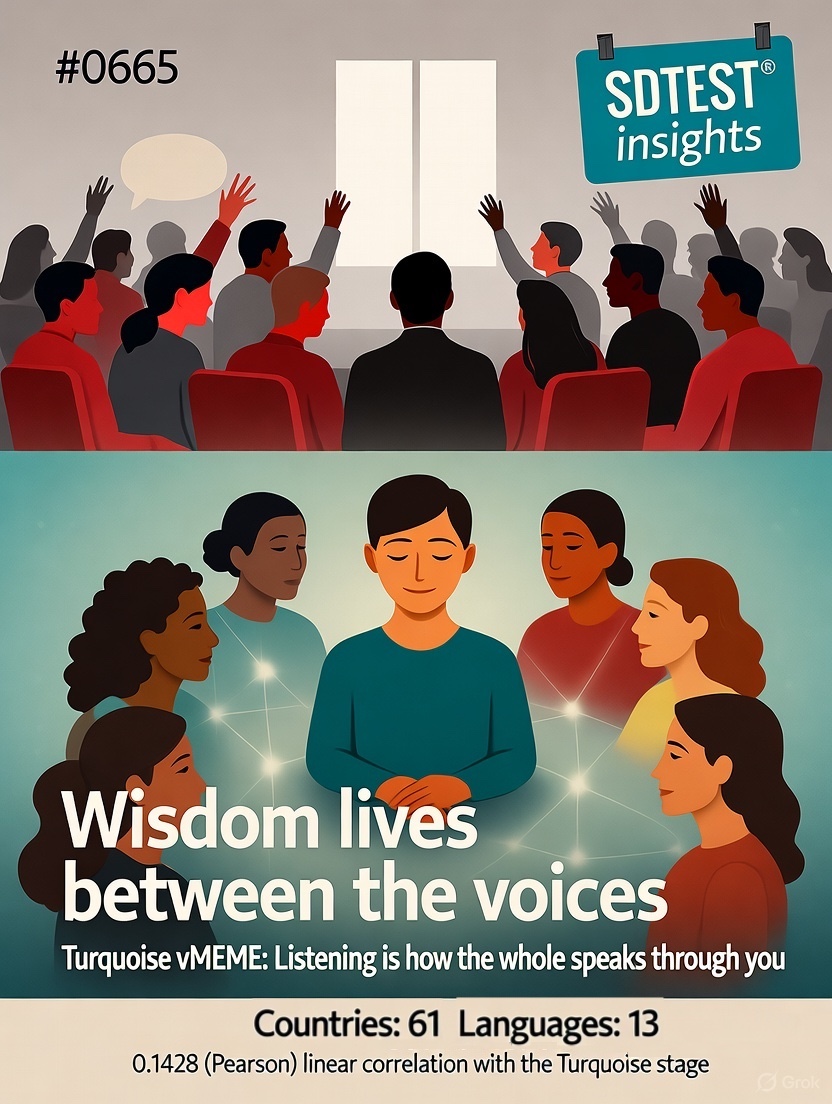
This positive correlation of 0.1428 between "Ability to shut up, listen, and learn from others / Strongly Agree" and the Turquoise stage offers profound insights when viewed through the lens of the Turquoise value system:
Organizational Perspective:
Organizations operating within the Turquoise mindset might interpret this correlation as:
- Validation of their holistic understanding that deep listening serves as a portal to collective intelligence and the interconnected wisdom flowing through all organizational stakeholders and ecosystems
- Confirmation that their ecological business philosophy recognizes listening as a sacred practice that dissolves ego boundaries and enables organizations to attune to larger planetary and cosmic patterns
- Evidence supporting their belief that organizational evolution requires leaders and members who can silence individual agendas to receive guidance from the living systems they participate in
These organizations might respond by:
- Cultivating contemplative listening practices: meditation, council circles, deep dialogue, as core organizational competencies rather than optional skills
- Creating decision-making structures that prioritize collective sensing and deep listening to stakeholder voices, natural systems, and emergent patterns over individual expertise
- Developing regenerative business models where organizational strategy emerges from listening to the interconnected web of human, ecological, and cosmic intelligence
Team Perspective:
Teams operating from a Turquoise mindset might approach this correlation by:
- Viewing it as an affirmation that team wisdom emerges through members' capacity to silence inner narratives and listen to the collective field of consciousness
- Interpreting it as support for their understanding that deep listening dissolves separation and reveals the underlying unity connecting all team members with larger living systems
- Seeing it as validation for team practices where listening becomes a spiritual discipline that opens channels to planetary intelligence and universal wisdom
These teams might respond by:
- Establishing team rituals centered on contemplative listening, sitting in silence, witnessing without judgment, and honoring each voice as an expression of collective wisdom
- Creating collaborative processes where decisions emerge from deep listening to what wants to happen through the team rather than from individual agendas
- Developing team cultures where listening is understood as a sacred practice of recognizing the interconnected consciousness manifesting through diverse perspectives
Individual Perspective:
Individuals aligned with the Turquoise value system might interpret this correlation as:
- Personal validation that their commitment to deep listening reflects spiritual maturity and recognition of the universal intelligence speaking through all beings
- Evidence supporting their understanding that silencing the ego-mind to listen authentically connects them to the cosmic web of consciousness
- Confirmation that their practice of listening serves not just personal learning but participation in the collective awakening and planetary healing
These individuals might respond by:
- Deepening contemplative practices that expand listening capacity beyond words to energy, presence, and the unspoken wisdom in silence and nature
- Engaging listening as a spiritual discipline that honors every being, human and non-human, as a teacher carrying essential fragments of universal truth
- Using their listening capacity to serve as conduits for collective intelligence and planetary consciousness to flow through them
This correlation, viewed through the Turquoise lens, suggests that those operating at the Turquoise level understand listening as far more than a communication skill; it becomes a sacred practice of cosmic attunement.
The reasons why people with strong Turquoise values strongly agree that listening is essential could include:
- Unity Consciousness: Understanding that deep listening dissolves the illusion of separation and reveals the fundamental interconnectedness of all existence
- Ecological Intelligence: Recognizing that listening attunes individuals to the wisdom flowing through natural systems, communities, and the living planet
- Collective Wisdom Access: Believing that authentic listening opens channels to collective intelligence and universal consciousness beyond individual knowing
- Spiritual Practice: Viewing listening as a contemplative discipline that quiets the ego and enables the reception of cosmic guidance and planetary wisdom
- Evolutionary Service: Recognizing that deep listening serves the collective awakening and planetary transformation by honoring all voices and perspectives
This correlation prompts us to consider how holistic consciousness transforms listening from a functional skill into spiritual practice and ecological attunement. It raises questions about the relationship between receptivity, cosmic consciousness, and the evolution of human awareness.
Ultimately, this correlation highlights the profound interplay between contemplative presence, interconnected wisdom, and lifelong learning. In Turquoise environments, strong agreement with deep listening as essential skill might reflect understanding that authentic listening is sacred practice, a portal through which individuals access collective intelligence, honor the wisdom present in all beings and natural systems, and participate consciously in the interconnected web of existence where every voice carries fragments of the universal truth necessary for planetary healing and the continued evolution of consciousness itself toward greater harmony, sustainability, and recognition of our fundamental unity with all life and the cosmos.
What insights do you gain from today's correlation? How might we study this relationship more carefully before deducing causation?
We welcome respectful and wise perspectives! Stay tuned every week as we share more results and insights.
After login or registration, free access to the poll results in the FAQ section.
[1] www.linkedin.com/in/samarchyan
[2] www.linkedin.com/in/jeremiah-teo-charisma-business-coach
2025.10.26
FearpersonqualitiesprojectorganizationalstructureRACIresponsibilitymatrixCritical ChainProject Managementfocus factorJiraempathyleadersbossGermanyChinaPolicyUkraineRussiawarvolatilityuncertaintycomplexityambiguityVUCArelocatejobproblemcountryreasongive upobjectivekeyresultmathematicalpsychologyMBTIHR metricsstandardDEIcorrelationriskscoringmodelGame TheoryPrisoner's Dilemma
ویلرای کوسنکو
د محصول مالک SaaS SDTEST®
والیري په 1993 کې د ټولنیز زده کړې - ارواپوه په توګه وړتیا درلوده او له هغه وخت راهیسې یې د پروژې مدیریت کې خپله پوهه پلي کړې.
والیري په 2013 کې د ماسټرۍ سند او د پروژې او پروګرام مدیر وړتیا ترلاسه کړه. د خپل ماسټر پروګرام په جریان کې، هغه د پروژې سړک نقشه (GPM Deutsche Gesellschaft für Projektmanagement e. V.) او Spiral Dynamics سره آشنا شو.
والیري د V.U.C.A د ناڅرګندتیا سپړلو لیکوال دی. په ارواپوهنه کې د سپیرل ډینامیکونو او ریاضياتو احصایې کارولو مفهوم، او 38 نړیوالې ټولپوښتنې.








